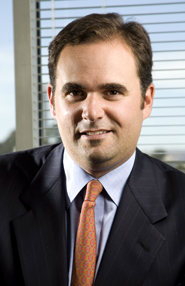Brett Mock, the departing Security Traders Association chairman, will likely have much more free time on his hands next year. He said he has spent a great deal of time with STA over the last year talking to lawmakers and regulators.

“I’ve had a second day job,” he said, explaining that he has worked to educate lawmakers and other officials on everything from dark pools to circuit breakers to general concepts about fairness in the marketplace.
Part of his STA work, Mock conceded, has been countering a wave of economic populism among citizens and in Congress that has pitted the trading industry against the general public.
“There is so much education that we had going on because there has been this perception that Wall Street is on one side, and Main Street is on the other,” Mock said. The STA has emphasized that the group tries to protect both investors and trading professionals.
Mock said he has also battled some stereotypes. For example, he noted that STA’s membership goes far beyond traders who work for investment banks that took TARP money.
“Indeed, I would say that we don’t even have that many people who are prop traders,” he said. Mock stressed that STA also includes traders who run and manage pension funds for ordinary folks.
It has also been a busy year for Mock, owing to the passage of the financial regulation bill. He has even spent time in Washington exploring what went wrong in the 2008 market meltdown.
“We’ve had productive meetings and many long meetings. Among others, we’ve met with five SEC commissioners and with 15 to 20 members of Congress,” Mock said. He added that he has also devoted much time working internally to put a greater emphasis on regulatory issues for the group’s annual conference. And the industry has responded.
“There’s been a good deal of feedback on this. We’re sold out on these sessions. We have more people who want to attend, more people who want to participate and speak than we have slots,” Mock said.
One of the bigger issues, he added, is the “flash crash.” In the wake of last May’s event, Mock said, the STA has been making its case for consistent trading rules. “There needs to be uniform standards regarding circuit breakers, stock halts and the procedure for canceling trades,” he said.
Mock has argued that the lack of consistency among exchanges is a problem. A regulator, he said, “needs to provide clear, concise and consistent guidelines.” Traders and investors need such rules so that they can properly allocate capital and make decisions.
As Mock ends his year as chairman, there is one piece of unfinished business that will require filling some big shoes. The STA, with the impending departure of John Giesea, is in the midst of a search for a new president and CEO. Mock praised Giesea for his accomplishments during his near decade at the helm. “We’ve appreciated all his hard work,” Mock added. “Especially his representation in Washington, D.C.”
With Giesea’s announced retirement to take effect at the end of the year, Mock said the STA will be looking beyond the roots of the organization for its next head. It plans to conduct a broad-based search. The STA was once a group comprised almost entirely of Nasdaq market makers.



